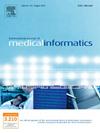RelAI:一种自动判断逐点机器学习预测可靠性的方法
IF 3.7
2区 医学
Q2 COMPUTER SCIENCE, INFORMATION SYSTEMS
International Journal of Medical Informatics
Pub Date : 2025-02-25
DOI:10.1016/j.ijmedinf.2025.105857
引用次数: 0
摘要
人工智能/机器学习的进步是显著的,但它们在临床实践中的部署面临后勤、监管和信任相关的挑战。为了在现实场景中促进信任和明智地使用机器学习预测,对个人预测的可靠评估是必不可少的。我们提出了RelAI,这是一个对ML预测进行点对可靠性评估的工具,可以支持在部署期间识别预测错误。relai利用自动编码器(ae)来检测分布变化(密度原则)和代理模型来编码局部性能(局部拟合原则)。我们在一个合成数据集和一个涉及多发性硬化症(MS)患者结果的真实场景上验证了RelAI。结果在一个合成数据集上,RelAI有效地识别了不可靠的预测,优于其他方法。在MS病例研究中,可靠的预测显示出更高的准确性,并与特定的人口统计学特征(如性别、居住地和眼部症状)相关。relai可以通过提供点对可靠性评估、确保合规性和培养用户信任来支持ML在临床环境中的部署。它与模型无关的特性以及与基于python的ML管道的兼容性增强了它被广泛采用的潜力。本文章由计算机程序翻译,如有差异,请以英文原文为准。

RelAI: an automated approach to judge pointwise ML prediction reliability
Objectives
AI/ML advancements have been significant, yet their deployment in clinical practice faces logistical, regulatory, and trust-related challenges. To promote trust and informed use of ML predictions in real-world scenarios, reliable assessment of individual predictions is essential. We propose RelAI, a tool for pointwise reliability assessment of ML predictions that can support the identification of prediction errors during deployment.
Materials and Methods
RelAI utilizes Autoencoders (AEs) to detect distributional shifts (Density principle) and a proxy model to encode local performance (Local Fit principle). We validated RelAI on a synthetic dataset and a real-world scenario involving Multiple Sclerosis (MS) patient outcomes.
Results
On a synthetic dataset, RelAI effectively identified unreliable predictions, outperforming alternative approaches. In the MS case study, reliable predictions exhibited higher accuracy and were associated with specific demographic features, such as sex, residence, and eye symptoms.
Discussion and Conclusion
RelAI can support ML deployment in clinical settings by providing pointwise reliability assessments, ensuring regulatory compliance, and fostering user trust. Its model-agnostic nature and its compatibility with Python-based ML pipelines enhance its potential for widespread adoption.
求助全文
通过发布文献求助,成功后即可免费获取论文全文。
去求助
来源期刊

International Journal of Medical Informatics
医学-计算机:信息系统
CiteScore
8.90
自引率
4.10%
发文量
217
审稿时长
42 days
期刊介绍:
International Journal of Medical Informatics provides an international medium for dissemination of original results and interpretative reviews concerning the field of medical informatics. The Journal emphasizes the evaluation of systems in healthcare settings.
The scope of journal covers:
Information systems, including national or international registration systems, hospital information systems, departmental and/or physician''s office systems, document handling systems, electronic medical record systems, standardization, systems integration etc.;
Computer-aided medical decision support systems using heuristic, algorithmic and/or statistical methods as exemplified in decision theory, protocol development, artificial intelligence, etc.
Educational computer based programs pertaining to medical informatics or medicine in general;
Organizational, economic, social, clinical impact, ethical and cost-benefit aspects of IT applications in health care.
 求助内容:
求助内容: 应助结果提醒方式:
应助结果提醒方式:


